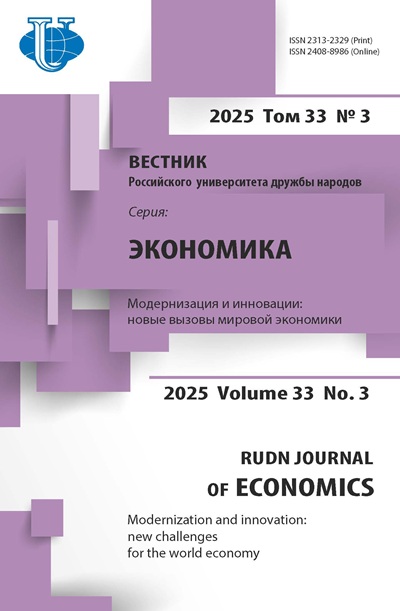La crise economique mondiale comme revelateur de la crise de la theorie macro-economique et de la necessite de sa reconstruction
- Авторы: Бертомье К.1, Ри А.1
-
Учреждения:
- Университет Ниццы София Антиполис
- Выпуск: № S5 (2011)
- Страницы: 288-297
- Раздел: Статьи
- URL: https://journals.rudn.ru/economics/article/view/12168
- ID: 12168
Цитировать
Полный текст
Аннотация
La crise financière qui a éclaté aux Etats-Unis, au cours de l’été 2007, puis s’est propagée à travers l’ensemble de la planète en se transformant en crise réelle dans un très grand nombre de pays, a révélé que la théorie macroéconomique dominante, aujourd’hui, dans l’enseignement académique, a été dans l’incapacité de prévoir ces évènements.
Ключевые слова
Об авторах
Клод Бертомье
Университет Ниццы София Антиполис
Email: berthomi@unice.fr
Анастасия Ри
Университет Ниццы София Антиполис
Email: ri@unice.fr
Список литературы
- Akerlof, George A. 2007. “The Missing Motivation in Macroeconomics.” The American Economic Review, 97 (1): 5—36.
- Arestis, Philip. 2009. “New Consensus Macroeconomics: A Critical Appraisal.” The Levy Economics Institute, N.Y., Working Paper №. 564: 1—26.
- Berthomieu, Claude. 2010. «La théorie macroéconomique moderne à nouveau en débat: l’impossible synthèse. Conséquence sur le rôle de l’Etat.» In C. Berthomieu and E. Ponomarenko (ed.). La théorie économique moderne et la réformation de l’économie russe, Moscou: Economica, pp.12—20.
- Berthomieu, Claude, et Christophe Ehrhart. 2000. «Le néo-structuralisme comme fondement d’une stratégie de développement alternative aux recommandations néo-libérales.» Economie Appliquée, Tome LIII, n°4 (déc), pp. 61—91.
- Berthomieu, Claude, Christophe Ehrhart, et Leticia Hernández-Bielma. 2005. «El neostructuralismo como renovación del paradigma estructuralista de la economía del desarrollo.» Problemas del Desarrollo, vol. 36 (143): 9—32.
- Berthomieu, Claude, Christophe Ehrhart, et Leticia Hernández-Bielma. 2006. «Estabilización, ajuste externo y estrategia de desarollo economico: el neoestructuralismo como alternativa al. neoliberalismo.» Análisis Económico, vol. XXI (48): 5—30.
- Berthomieu, Claude, Anastasia Ri, et Kamilya Suleymenova. 2010. «Hiver 2006/2007: des macro-économistes prestigieux s’interrogent sur la double dimension scientifique et pratique de leur discipline.» In C. Berthomieu and E. Ponomarenko (ed.). La théorie économique moderne et la réformation de l’économie russe, Moscou: Economica, pp.76—87.
- Bernanke, Ben S., and Mark Gertler. 1986. «Agency Costs, Collateral, and Business Fluctuations.» NBER Working Paper No. W2015.
- Blanchard, Olivier J. 2008. “The State of Macro”, N.B.E.R.Working Paper 14259, August.
- Chari, V.V., and Patrick J. Kehoe. 2006. «Modern Macroeconomics in Practice: How Theory is Shaping Policy.» Journal of Economic Perspectives, 2006 (4):3—28.
- Fama, Eugene. 1980. “Banking in The Theory of Finance.” Journal of Monetary Economics, 1980(6): 39—57.
- Goodfriend, M., and R.G. King. 1997. “The New Neoclassical Synthesis and the Role of Monetary Policy.” In B.S. Bernanke and J.J. Rotemberg (ed.), NBER Macroeconomics Annual: 1997. Cambridge, MA: MIT Press.
- Kiyotaki, Nobuhiro, and John Moore. 1997. “Credit Cycles.” Journal of Political Economy, 105(2): 211—248.
- Krugman, Paul. 2009. “How Did Economists Get It So Wrong.” The New York Times, September 6, 11 p.
- Mankiw, Gregory N. 2006. “The Macroeconomist as Scientist and Engineer.” Journal of Economic Perspectives, 20(4): 29—46.
- Samuelson, Paul A. 1955. Economics, 3rd ed., New York, Mc Graw-Hill.
- Shleifer, Andrei, and Robert W. Vishny. 1997. “The Limits of Arbitrage.” The Journal of Finance, 52(1): 35—55.
- Snowdon, Brian, Howard Vane, and Peter Wynarcyk. 1994. A Modern Guide To Macroeconomics: An Introduction to Competing School of Thought, Edward Elgar, Cambridge, 459 p.
- The Economist, (18th/07/2009), “Briefing: The state of economics; The other-worldly philosophers” (pp. 68—70), and “Financial Economics: Efficiency and beyond” (pp.71—72).
- Van Treeck, Till. 2009. “The macroeconomics of “financialisation” and the deeper origins of the world economic crisis.” I.M.K Working Paper n°9/2009, November, 30 p.
- Walras, M. E. Léon, Eléments d’économie politique pure ou théorie de la richesse sociale, nombreuses éditions (1ère éd. 1874).
- White, William. 2009. «La macroéconomie moderne s’égare.» Finance & Développement, (décembre), pp. 15—18.
- Woodford, Michael. 2009. “Convergence in Macroeconomics: Elements of the New Synthesis.” Macroeconomics, American Economic Journal, 1(1): 267—279.
Дополнительные файлы













